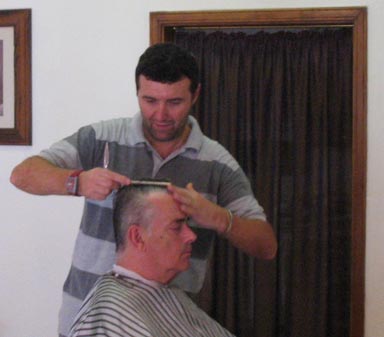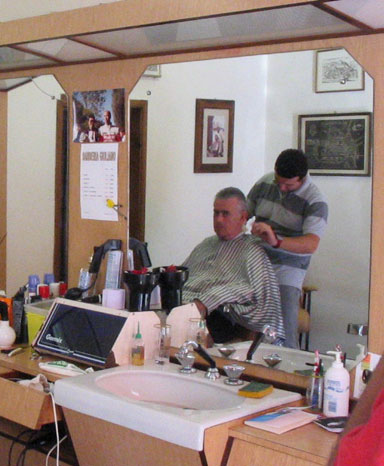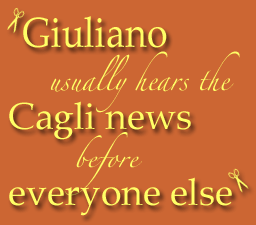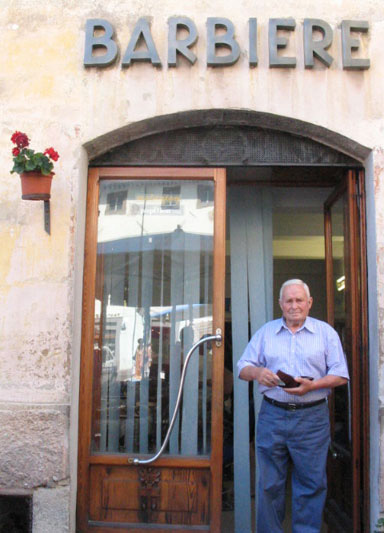| |
|
|
|
|
 |
story
by: rose bresevich
photos by: chris egoville
video by: nick prindle
web design by: jennifer pesonen |
Within
the vicinity of Cagli's central Piazza Matteoti, there exists six haircutting
establishments, four barbers and two unisex salons. At first glance the
orange canopy of Giuliano's barbiere catches your eye; a little further
down the same street, Mario's shop displays the traditionally simple sign.
These two shops are distinctive due to the crowds of older men who often
surround the doorways, yet, surprisingly, upon entering the comfortably
cool, tiled rooms, you might find only one man in need of a trim or shave.
Giuliano and Mario, each located in the piazza for over thirty years, readily
answer my questions, share stories and nicknames, and allow me to take pictures.
The other two barbiere, slightly off the cobblestone path of the piazza,
are more reserved in their responses and, unfortunately, not nearly as helpful.
Giovanni, the third barbiere, refuses photos, tells me he hasn't heard any
stories, and that he doesn't have a nickname while the fourth barbiere doesn't
even offer me his name. And so I am introduced to the life of the barbiere
with the helpful participation of the gregarious Giuliano and Mario. |
| Each has
his own customers and claim no rivalry with the other. How can this be?
I roughly estimate over 4,500 Cagliese men requiring haircuts live in town.
Does either barber notice competition between the shops? "Cosi, cosi," says
Giuliano as he pulls a blade over the stubble of a young customer. Mario
tells me that he's friends with everyone, but not everyone is friends with
him. I take this as a roundabout way to admit some rivalry exists while
leaving the interviewer with a good impression. In fact, a good impression
is what I should be making with Mario. Mario's customers keep coming back
to avoid "portare sfiga," or the bringing of bad luck. Superstitions are
found in all cultures; in America, for example, I have friends who'll sit
only in certain chairs during a haircut. Here in Cagli, Mario tells me the
story of one impatient customer, annoyed at the long wait for a trim, he
left in a huff. Later that day, the same man was admitted to the hospital
with painful stomach problems. |

A
local man enjoys a trim at Giuliano's barber shop. |

Almost
done with the haircut. |
To get
the point across, Mario emphasizes that the man had been perfectly healthy.
As Mario continues with his snipping, waiting customers testify to the truth
of his powers. Hmmmm, mysterious. In fact, the customer under the blade
of Mario's scissors is a loyal young man who visits Mario every month from
out of town in order to maintain a good relationship. What would happen
if he didn't keep in touch? I'm left to wonder. In Italy it seems that customer
loyalty extends beyond good-natured, friendly reasons. Location is key in
a town as small town as Cagli. Perhaps fittingly, the popularity of the
central barbers make Mario and Giuliano, at least, more sociable. The positioning
of their shops encourages the flow of interpersonal communication, providing
a place for men to socialize. Their shops are pleasing to photograph and
their stories interesting. I do, however, admire the humble independence
of Giovanni and Barbiere #4. Although their modest stance frustrates me
when performing research, I realize their primary purpose is not to befriend
strangers. Perhaps not intentionally so, their location away from the center
of activity may dictate how inviting they are to outsiders in the community.
|
Back in
New York, when my father goes to his barber Claudio, he has to reserve an
hour even if he has only a few stray hairs to trim. Claudio, like his counterparts
in Cagli, likes to talk. The comfort found in the reclinable chair leads
to easy conversations in the company of friends. These can include ridiculous
stories or even hushed confessions of love affairs. Both Guiliano and Mario
admit that they hear a lot of stories, but in sharing them with me, they
remain discreet and keep the details generic. Clearly, they don't want to
breach the trust of their clients. As a result, Cagliese men flock to this
sanctuary in search of comfort and some good 'ol "chiacchiere," or gossip
talk. Giuliano says that the only thing missing from his place is a cup
of coffee. Although located in Old Cagli, the barbiere can't help but face
the latest changes in men's hairstyles. What do they think of unisex salons,
with their dyed and gelled hair?
The barbiere shave their patrons while the unisex do not, the unisex dye
hair while the barbiere do not. Mario, on the other hand, believes the unisex
salons don't give "real" haircuts. He says they only know how to cut women's
hair, they make it look messy, and they carelessly apply gel. Apparently,
Mario doesn't know that Giuliano was responsible for training one popular
unisex hairdresser, Matteo, in cutting men's hair. In the end, the greatest
controversy relates to hair styles, not to the loyalty of the patrons or
competition between barbers. A place to go, a person to talk to, a trim
and a shave. A barbiere's shop is as comfortable as home. Whether talking
about soccer or hearing the latest news in the town, the barbiere of Cagli
take pride in their job. Some are more talkative than others, but my general
impression of the Italian way of life emphasizes communication and comfort
between people. Whether humble or outspoken, the men of Cagli find at the
barbiere another home away from home, away from the cafès, away from
the city hall wall, in the comfort of a leather chair under a layer of soapy
lather. |


After
a haircut, one of Mario's loyal customers leaves his shop. |
| Click
here to see an interview with Mario, one of Cagli's barbers |
|




